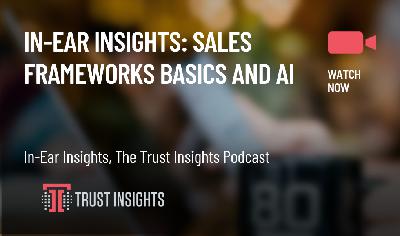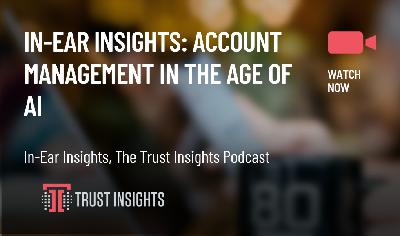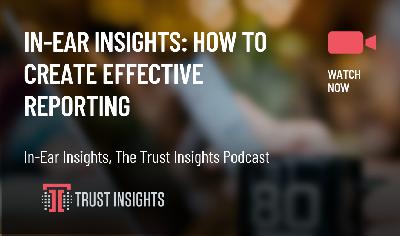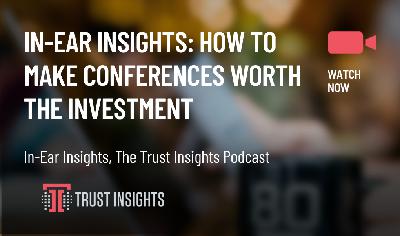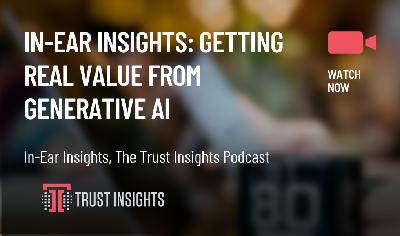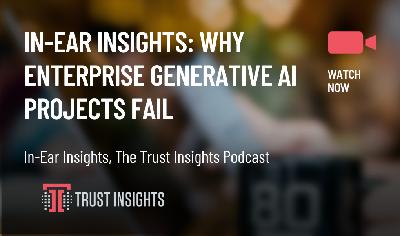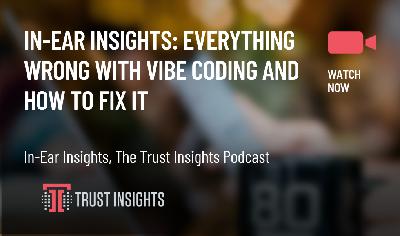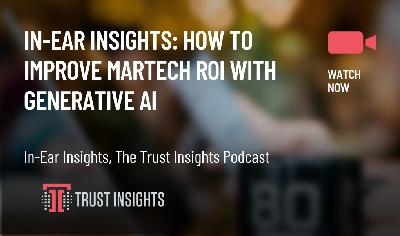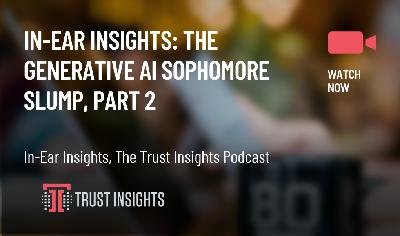In-Ear Insights: Do Websites Matter in the Age of AI?
Description
In this episode of In-Ear Insights, the Trust Insights podcast, Katie and Chris discuss whether blogs and websites still matter in the age of generative AI.
You’ll learn why traditional content and SEO remain essential for your online presence, even with the rise of AI. You’ll discover how to effectively adapt your content strategy so that AI models can easily find and use your information. You’ll understand why focusing on answering your customer’s questions will benefit both human and AI search. You’ll gain practical tips for optimizing your content for “Search Everywhere” to maximize your visibility across all platforms. Tune in now to ensure your content strategy is future-proof!
Watch the video here:
Can’t see anything? Watch it on YouTube here.
Listen to the audio here:
https://traffic.libsyn.com/inearinsights/tipodcast-do-websites-matter-in-the-age-of-ai.mp3
- Need help with your company’s data and analytics? Let us know!
- Join our free Slack group for marketers interested in analytics!
[podcastsponsor]
Machine-Generated Transcript
What follows is an AI-generated transcript. The transcript may contain errors and is not a substitute for listening to the episode.
Christopher S. Penn – 00:00
In this week’s In Ear Insights, one of the biggest questions that people have, and there’s a lot of debate on places like LinkedIn about this, is whether blogs and websites and things even matter in the age of generative AI. There are two different positions on this. The first is saying, no, it doesn’t matter. You just need to be everywhere. You need to be doing podcasts and YouTube and stuff like that, as we are now. The second is the classic, don’t build on rented land. They have a place that you can call your own and things. So I have opinions on this, but Katie, I want to hear your opinions on this.
Katie Robbert – 00:37
I think we are in some ways overestimating people’s reliance on using AI for fact-finding missions. I think that a lot of people are turning to generative AI for, tell me the best agency in Boston or tell me the top five list versus the way that it was working previous to that, which is they would go to a search bar and do that instead. I think we’re overestimating the amount of people who actually do that.
Katie Robbert – 01:06
Given, when we talk to people, a lot of them are still using generative AI for the basics—to write a blog post or something like that. I think personally, I could be mistaken, but I feel pretty confident in my opinion that people are still looking for websites.
Katie Robbert – 01:33
People are still looking for thought leadership in the form of a blog post or a LinkedIn post that’s been repurposed from a blog post. People are still looking for that original content. I feel like it does go hand in hand with AI because if you allow the models to scrape your assets, it will show up in those searches. So I guess I think you still need it. I think people are still going to look at those sources. You also want it to be available for the models to be searching.
Christopher S. Penn – 02:09
And this is where folks who know the systems generally land. When you look at a ChatGPT or a Gemini or a Claude or a Deep Seat, what’s the first thing that happens when a model is uncertain? It fires up a web search. That web search is traditional old school SEO. I love the content saying, SEO doesn’t matter anymore. Well, no, it still matters quite a bit because the web search tools are relying on the, what, 30 years of website catalog data that we have to find truthful answers.
Christopher S. Penn – 02:51
Because AI companies have realized people actually do want some level of accuracy when they ask AI a question. Weird, huh? It really is. So with these tools, we have to. It is almost like you said, you have to do both. You do have to be everywhere.
Christopher S. Penn – 03:07
You do have to have content on YouTube, you do have to post on LinkedIn, but you also do have to have a place where people can actually buy something. Because if you don’t, well.
Katie Robbert – 03:18
And it’s interesting because if we say it in those terms, nothing’s changed. AI has not changed anything about our content dissemination strategy, about how we are getting ourselves out there. If anything, it’s just created a new channel for you to show up in. But all of the other channels still matter and you still have to start at the beginning of creating the content because you’re not. People like to think that, well, I have the idea in my head, so AI must know about it. It doesn’t work that way.
Katie Robbert – 03:52
You still have to take the time to create it and put it somewhere. You are not feeding it at this time directly into OpenAI’s model. You’re not logging into OpenAI saying, here’s all the information about me.
Katie Robbert – 04:10
So that when somebody asks, this is what you serve it up. No, it’s going to your website, it’s going to your blog post, it’s going to your social profiles, it’s going to wherever it is on the Internet that it chooses to pull information from. So your best bet is to keep doing what you’re doing in terms of your content marketing strategy, and AI is going to pick it up from there.
Christopher S. Penn – 04:33
Mm. A lot of folks are talking, understandably, about how agentic AI functions and how agentic buying will be a thing. And that is true. It will be at some point. It is not today. One thing you said, which I think has an asterisk around it, is, yes, our strategy at Trust Insights hasn’t really changed because we’ve been doing the “be everywhere” thing for a very long time.
Christopher S. Penn – 05:03
Since the inception of the company, we’ve had a podcast and a YouTube channel and a newsletter and this and that. I can see for legacy companies that were still practicing, 2010 SEO—just build it and they will come, build it and Google will send people your way—yeah, you do need an update.
Katie Robbert – 05:26
But AI isn’t the reason. AI is—you can use AI as a reason, but it’s not the reason that your strategy needs to be updated. So I think it’s worth at least acknowledging this whole conversation about SEO versus AEO versus Giao Odo. Whatever it is, at the end of the day, you’re still doing, quote unquote, traditional SEO and the models are just picking up whatever you’re putting out there. So you can optimize it for AI, but you still have to optimize it for the humans.
Christopher S. Penn – 06:09
Yep. My favorite expression is from Ashley Liddell at Deviate, who’s an SEO shop. She said SEO now just stands for Search Everywhere Optimization. Everything has a search. TikTok has a search. Pinterest has a search. You have to be everywhere and then you have to optimize for it. I think that’s the smartest way to think about this, to say, yeah, where is your customer and are you optimizing for?
Christopher S. Penn – 06:44
One of the things that we do a lot, and this is from the heyday of our web analytics era, before the AI era, go into your Google Analytics, go into referring source sites, referring URLs, and look where you’re getting traffic from, particularly look where you’re getting traffic from for places that you’re not trying particularly hard.
Christopher S. Penn – 07:00
So one place, for example, that I occasionally see in my own personal website that I have, to my knowledge, not done anything on, for quite some time, like decades or years, is Pinterest. Every now and again I get some rando from Pinterest coming. So look at those referring URLs and say, where else are we getting traffic from? Maybe there’s a there. If we’re getting traffic from and we’re not trying at all, maybe there’s a there for us to try something out there.
Katie Robbert – 07:33
I think that’s a really good pro tip because it seems like what’s been happening is companies have been so focused on how do we show up in AI that they’re forgetting that all of these other things have not gone away and the people who haven’t forgotten about them are going to capitalize on it and take that digital footprint and take that market share. While you were over here worried about how am I going to show up as the first agency in Boston in the OpenAI search, you still have—so I guess to your question, where you originally asked, is, do we still need to think about websites and blogs and that kind of content dissemination? Absolutely. If we’re really thinking about it, we need to consider it even more.
Katie Robbert – 08:30
We need to think about longer-form content. We need to think about content that is really impactful and what is it? The three E’s—to entertain, educate, and engage. Even more so now because if you are creating one or two sentence blurbs and putting that up on your website, that’s what these models are going to pick up and that’s it. So if you’re like, why is there not a more expansive explanation as to who I am? That’s because you didn’t put it out there.
Christopher S. Penn – 09:10
Exactly. We were just doing a project for a client and were analyzing content on their website and I kid you not, one page had 12 words on it. S


